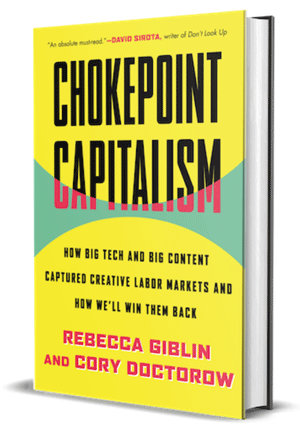Why you should read “Chokepoint Capitalism”
A new book explains how we got to our age of giant culture companies shaking down artists, why it matters to the rest of us, and what we can do about it.
By Brad Berens
It baffles me that Rebecca Giblin and Cory Doctorow’s book Chokepoint Capitalism isn’t on top of The New York Times bestseller list. It’s an important book about how big companies have captured most of the value in the creator economy, leaving artists, musicians, and writers of all sorts struggling to make ends meet.
 There are also clear harms to the rest of us, the audiences who want to enjoy all forms of art but whose options are shrinking while prices skyrocket. Plus, artists are only one set of workers watching big companies extract disproportionate value. As the authors make clear, chokepoint capitalism is also suffocating gig workers of all kinds, suppliers, and professionals.
There are also clear harms to the rest of us, the audiences who want to enjoy all forms of art but whose options are shrinking while prices skyrocket. Plus, artists are only one set of workers watching big companies extract disproportionate value. As the authors make clear, chokepoint capitalism is also suffocating gig workers of all kinds, suppliers, and professionals.
None of this is news to anybody who has been paying attention, nor is it news to the creators themselves, but Giblin and Doctorow pull open cultural curtains to let blazing sunlight into deliberately darkened rooms in ways that are bracing and appalling.
They tell arresting stories, like how the Recording Industry Association of America paid a Congressional staffer to surreptitiously insert four words into a law between when it was written by legislators and when the President signed it. This change stole millions of dollars from musicians by turning some recordings into work-for-hire that therefore did not earn royalties. It took a concerted effort on the part of musicians to expose this theft and get the amendment rolled back. The congressional staffer who perpetrated what the authors call a “dead-of-night maneuver,” Mitch Glazier, later became the RIAA’s CEO and Chair.
They write about how Audible encouraged customers to return audiobooks after they had listened to them in their entirety and exchange them for new audiobooks. Then, Audible cheated the authors out of their royalties because the books had been returned. Only collective action on the part of audiobook creators pressured Audible into change.
The book connects negative business practices across ordinarily unconnected industries like news, books, music, movies, and television. The title, Chokepoint Capitalism, names a series of practices where intermediaries of all sorts sit at the narrow pinch point of an hourglass in order to demand fees from all who want to pass through it. That title, that name, gives readers a conceptual lens through which blurry things come into focus. One of my favorite such moments comes late in the book:
Warning: in this section, we’re going to get into the weeds around music licensing, which is mind-numbingly complex. If you find your eyes glazing over, remember this: it’s not hard to understand because it’s complicated, it’s complicated so it’ll be hard to understand. The people getting rich from it while artists starve don’t want you to know how it works. (217)
The best index of how important I think this book is? I’ve now bought it three times.
First Purchase: after I heard Doctorow talk about monopsonies on the Pivot Podcast, I immediately drove to Powell’s in downtown Portland and bought a hardback copy. You should do the same thing right now, either going directly to your local bookstore (if you’re lucky enough to have one) or ordering it from one of the online shops the authors suggest here.
(By the way, a “monopsony” is the buyer version of a monopoly: when there’s a monopoly only one company can sell a certain product, but when there’s a monopsony only one company can buy a certain product.)
Second Purchase: a short time later I had to drive a few hours to a conference in Bend, Oregon, and wanted to keep reading as I drove. Doctorow refuses to let Audible sell any of his audiobooks because Audible insists on DRM (Digital Rights Management software that prevents you from listening to your audiobooks on other platforms). To buy the audiobook edition of Chokepoint Capitalism, I had to sign up for an account on a different, DRM-free platform called Libro, which was painless and which I recommend that all you audiobook listeners do immediately after you finish reading this newsletter.
Actually, scratch that. Take a break from reading, go sign up for Libro, and then come back. I’ll wait. (Imagine me humming the Jeopardy waiting tune. . . oh, and did I mention that Libro shares profits with an independent bookstore of your choice? I chose Powell’s, of course. OK, is that long enough? Are you back? I’ll keep going.)
Driving to Bend, I decided to start listening to Chokepoint Capitalism from the beginning, and I continued to read the same book twice, once in print and once on audio. I have never done this before—that’s how important this book is.
The book connects negative business practices across ordinarily unconnected industries like news, books, music, movies, and television. The title, Chokepoint Capitalism, names a series of practices where intermediaries of all sorts sit at the narrow pinch point of an hourglass in order to demand fees from all who want to pass through it. That title, that name, gives readers a conceptual lens through which blurry things come into focus.
Third Purchase: I was having breakfast with S, a pal who is a hotshot movie executive. Every conversation with S is a high-speed omnidirectional quipathon where we dig into everything. At one point, as we were talking about the changing economics of entertainment and how musicians don’t make much money from recording anymore, S said, “yeah, but they make money from performing.”
“Nope,” I replied. One of the many lessons from Chokepoint Capitalism is that the tie-up between Live Nation and Ticketmaster drained an eye-popping amount of money out of musicians’ pockets because that merged company now controls or outright owns the acts, the venues, and the ticketing. With nowhere else to go, musicians are forced to accept lower and lower fees for performing.
After breakfast, S and I wandered to a convenient independent bookstore next door because I wanted to buy him a copy of Chokepoint Capitalism. They had the book, but it took a while for them to find a copy. My busy executive friend got antsy because he had stacked up meetings waiting for him.
“I can just order the book,” he said.
“You live a mile from here, right?” I asked.
“Yeah,” he said.
“I’m buying it for you here, even if I have to order it,” I said. “This is an independent bookstore.”
“What, are you saying I have to live my values???”
Thirty seconds later the clerk found the book, and S was on his way.
Giblin and Doctorow do more than just admire the problems they describe: the second half of the book suggests concrete steps that governments and organizations at all levels can take to widen chokepoints and create alternatives. One thing I appreciate about the book is that they don’t put the burden of creating change on individual citizens, who have no leverage and decreasing disposable income. We must all act together to create the world we want.
I’ll buy more copies of Chokepoint Capitalism to give away. You should, too.
__________

Brad Berens is the Center’s strategic advisor and a senior research fellow. He is principal at Big Digital Idea Consulting. You can learn more about Brad at www.bradberens.com, follow him on Post and/or LinkedIn, and subscribe to his weekly newsletter (only some of his columns are syndicated here).
See all columns from the Center.
April 12, 2023

